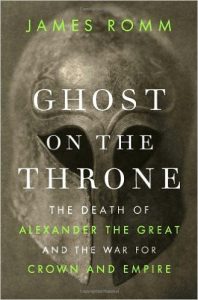 Who knew how exciting the events of the fourth century BC could be? Most of us have a dim idea of Alexander the Great—conqueror of Greece and points East, all the way to India. But it’s a pretty dim idea. And most of us have very little idea of what happened in the classical world after Alexander and before Julius Caesar. Perhaps we’re vaguely aware that the Egyptian Ptolemaic dynasty was started by one of Alexander’s lieutenants, who took that part of Alexander’s empire, and that the famous Cleopatra wasn’t Egyptian in the least. But mostly our awareness is a blank page. This book fills in a small part of that page.
Who knew how exciting the events of the fourth century BC could be? Most of us have a dim idea of Alexander the Great—conqueror of Greece and points East, all the way to India. But it’s a pretty dim idea. And most of us have very little idea of what happened in the classical world after Alexander and before Julius Caesar. Perhaps we’re vaguely aware that the Egyptian Ptolemaic dynasty was started by one of Alexander’s lieutenants, who took that part of Alexander’s empire, and that the famous Cleopatra wasn’t Egyptian in the least. But mostly our awareness is a blank page. This book fills in a small part of that page.
The basic frame of the book is the apocryphal story that Alexander, when dying and asked which of his lieutenants should succeed him, muttered “To the strongest.” Even though that’s almost certainly not true, his lieutenants certainly acted as if it was. This book chronicles that struggle, of the Diadochi, Alexander’s “successors,” and does an outstanding job. The author, James Romm, does an amazing job of sorting out conflicting and incomplete records (noting that many details are contradicted in the ancient sources), yet making the entire story, which sweeps across an enormous span of space and peoples, flow.
A wide range of indelible characters is here. First, the Greeks, such as Phocion, senior statesman and general of Athens, the eternal balancing moderate, overthrown in the end and executed by a fickle democratic electorate, as so often happened in the history of Athens. And Aristotle, tainted in Athenian eyes by his association with Macedon and similarly forced to flee by the Athenian democratic mob. Second, the Macedonian “successors,” all fighting each other, such as Ptolemy, who wisely holed up in Egypt, a defensible part of the fragmented empire, and lived to tell the tale, and Antigonus, known as One-Eye from the crossbow bolt he took in the face one morning and fought without removing the bolt all that day, who ultimately died in battle at the age of 81. Third, the family of Alexander, all women, ultimately exterminated but for a time extremely successful at using the legitimacy of their blood to manipulate pretenders to the throne: Olympias, Alexander’s mother; Cleopatra, his sister; and Adea Eurydice, his grand-niece. And, finally, wild cards like clever Eumenes, one of whose tricks give the book its name—he was continuously disrespected as a former clerk and not a Macedonian, but always outperformed, as they say, nearly winning control of the entire empire but falling short, which meant, of course, getting killed. (As to the Ghost on the throne: Eumenes got people to follow him by dressing up an empty throne with Alexander’s gear and armor and calling on his presence, which he convinced others favored his path.)
In addition to characters, the book is full of odd yet vibrant details, such as how the corpse of Alexander was not buried where he wished, at the obscure and distant Oracle of Amon in Egypt. Instead, it was put in a giant golden wagon and shuttled around, leading to its being seized by one pretender or another for use as a talisman. Probably not what Alexander imagined.
My only negative comment is not a criticism of the book. Despite the excellence of the writing, it’s very hard to remember the details, even a few weeks after reading. This is because I, like most people, have little existing knowledge and little frame of reference for the people covered by the book, and so almost all I know about the topics covered is this book. Without more, whether existing knowledge or reinforcement through casual reading about the topic (as happens with, say, Caesar), it’s hard to remember the details. But that’s just a function of one’s memory and knowledge, and hardly the author’s fault.
